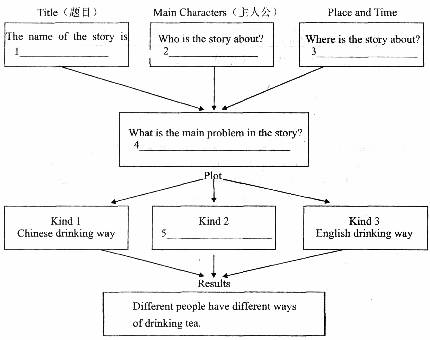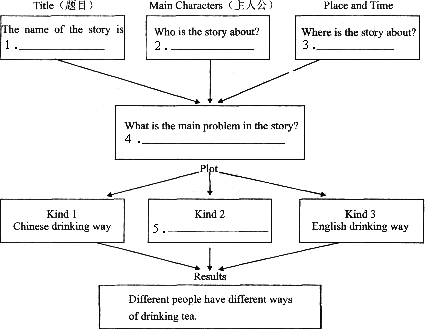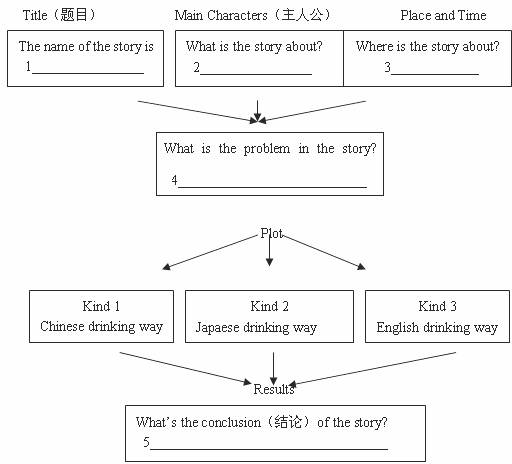
How to drink tea
All around the world,people drink tea.But tea does not mean the same thing to everyone.
In China,for example,tea is always served(招待)when people get together.The Chinese drink
it at any time of day at homes or in teahouse.They prefer their tea plain,with nothing else in it.
Tea is also important in Japan.The Japanese have a special(特别的)way of serving tea called a tea ceremony(仪式).It is very old and full of meaning.Everything must be done in a special way in the ceremony.There is even a special room for it in Japanese homes.
Another tea—drinking country is England.In England,the late afternoon is ‘‘tea time”.Almost everyone has a cup of tea then.The English usually make tea in tea-port and drink it with cream and sugar.They also eat cakes,cookies and little sandwiches at teatime.
Different people have different ways of drinking tea.

 轻松暑假总复习系列答案
轻松暑假总复习系列答案科目:初中英语 来源:2009年辽宁省锦州市中考英语试题 题型:051
根据短文内容完成文后的图表。
How to drink teaAll around the world, people drink tea.But tea does not mean the same thing to everyone.
In China, for example, tea is always served(招待)when people get together.The Chinese drink it at any time of day at homes or in teahouse.They prefer their tea plain, with nothing else in it.
Tea is also important in Japan.The Japanese have a special(特别的)way of serving tea called a tea ceremony(仪式).It is very old and full of meaning.Everything must be done in a special way in the ceremony.There is even a special room for it in Japanese homes.
Another tea-drinking country is England.In England, the late afternoon is ‘‘tea time”.Almost everyone has a cup of tea then.The English usually make tea in tea-port and drink it with cream and sugar.They also eat cakes, cookies and little sandwiches at teatime.
Different people have different ways of drinking tea.

查看答案和解析>>
科目:初中英语 来源: 题型:
根据短文内容完成文后的图表。
How to drink tea
All around the world, people drink tea.But tea does not mean the same thing to everyone.
In China, for example, tea is always served (招待)when people get together.The Chinese drink it at any time of day at homes or in teahouse.They prefer their tea plain, with nothing else in it.
Tea is also important in Japan.The Japanese have a special (特别的)way of serving tea called a tea ceremony (仪式).It is very old and full of meaning.Everything must be done in a special way in the ceremony.There is even a special room for it in Japanese homes.
Another tea-drinking country is England.In England, the late afternoon is “teatime”.Almost everyone has a cup of tea then.The English usually make tea in teaport and drink it with cream and sugar.They also eat cakes, cookies and little sandwishes at teatime.
Different people have different ways of drinking tea.

查看答案和解析>>
科目:初中英语 来源:同步题 题型:阅读理解
查看答案和解析>>
科目:初中英语 来源: 题型:阅读理解
Thank for your message. Yes, I’m having a great time 1 my exchange in France .It’s even better than I thought it 2 . I was a bit 3 before I arrived here, but there was no reason to be. My host family is really nice. They go out of their way to make me 4 at home. And you 5 believe how quickly my French has improved! I’m very comfortable 6 French now 7 I still make lots of mistakes, it doesn’t bother me like it used to. My biggest challenge is learning 8 at the dinner table. 9 you can imagine, things are really 10 the way they are at home. For example, you’re not supposed to put your bread on your plate. You’re supposed to put it on the table! I thought that was pretty strange at first, but now I 11 it .You’re not supposed to eat anything with your hands 12 bread, not even fruit! (You have to cut it up and eat it with a fork.) 13 thing is that it is very rude to say you’re full. If you don’t want 14 food, you should just say, “It was delicious.” Also, it’s rude to put your hands in your lap. You should always keep your hands, but not your elbows, on the table. I find 15 difficult to remember everything, but I’m gradually getting used to things, and don’t find them so strange any more. I’ll write soon and tell you more about life in France. Hope you’re having a good school year.
1. A. at B. during C. in D. on
2. A. was B. would be C. would D. used to be
3. A. excited B. annoyed C. happy D. nervous
4. A. to feel B. feel C. to stay D. stay
5. A. wouldn’t B. won’t C. shouldn’t D. don’t
6. A. speaking B. to speak C. saying D. to say
7. A. Yet B. But C. Although D. Ever
8. A. how to eat B. how to drink C. how to say D. how to behave
9. A. Like B. As C. Just like D. Just what
10. A. different from B. different of C. different between D. different as
11. A. am get used to B. am used to C. get use to D. used to
12. A. except B. besides C. beside D. including
13. A. The other B. Other C. Another D. Another one
14. A. any more B. no more C. any D. no
15. A. it B. that C. this D. that’s
查看答案和解析>>
湖北省互联网违法和不良信息举报平台 | 网上有害信息举报专区 | 电信诈骗举报专区 | 涉历史虚无主义有害信息举报专区 | 涉企侵权举报专区
违法和不良信息举报电话:027-86699610 举报邮箱:58377363@163.com